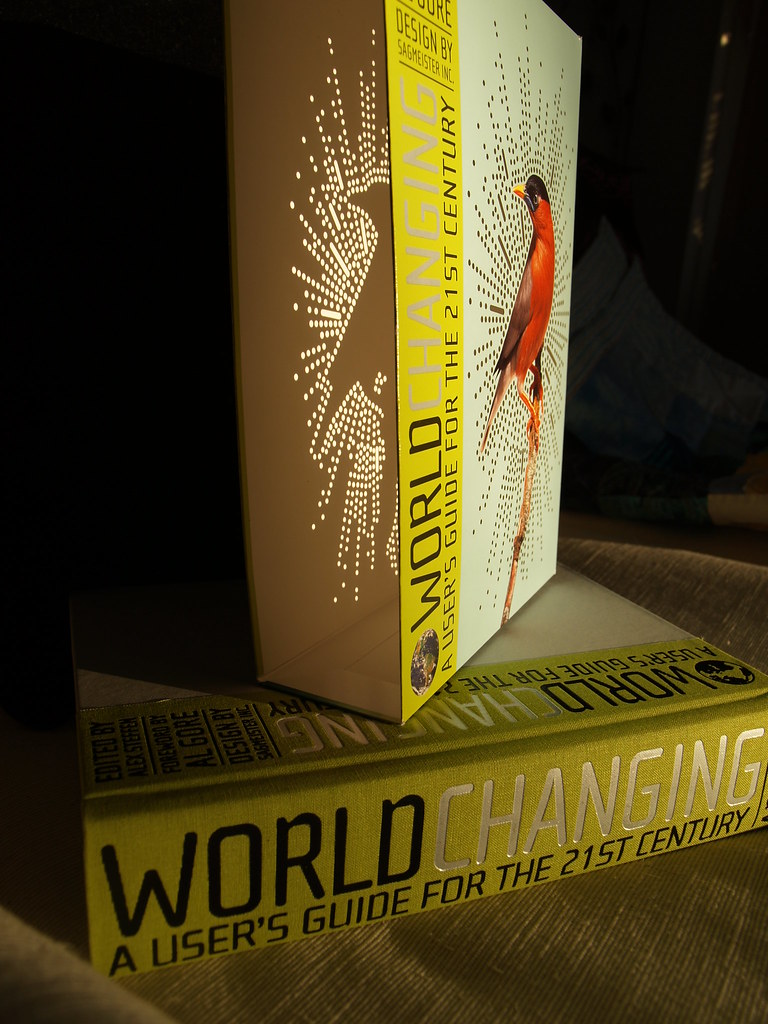The WorldChanging Book
 Here's how the system is supposed to work: you write a book. If people think it's good they buy it. If enough people think it's good it becomes a bestseller and widely read, spreading new ideas into the public debate.
Here's how the system is supposed to work: you write a book. If people think it's good they buy it. If enough people think it's good it becomes a bestseller and widely read, spreading new ideas into the public debate. Here's how the system actually works: you write a book. Unless your publisher spends large sums of money on marketing and promotions to convince booksellers that you will be a blockbuster, your book remains obscure, often quickly sinking out of view, and few people have a chance to see it, let alone encounter the ideas it contains.
These days, in other words, publishing is like the film industry (with its obsession about opening weekend ticket sales) or the music industry (with its focus on making hits). Big is everything. Big gets you into stores. Big gets you media coverage. Big gets enough people talking about your book that the ideas in them (if there are any) have a chance to spread. The Long Tail may keep your book in print, but it won't get your ideas into the mix.
Our book is not Big. It is thick; it is packed with solutions; it is, we think, smart and important.
But we don't have the blockbuster machine working for us. We have no marketing budget at all. Our publisher, Abrams, is terrific, but they are not a big company. They have a comparatively tiny promotions budget and don't have the kind of clout with booksellers to manufacture bestsellers.
Here's what we do have: you.
You're smart. You get it about systems and how they work and the importance of moving new ideas into the mainstream. You like a good hack.
Like this one: we have the capacity, if we work together, to put the Worldchanging book on the top of the Amazon bestseller list.
The Amazon list is hugely influential, indeed it's one of the main ways booksellers and media determine what books are "moving" and thus which books they should pay attention to. It's not the New York Times bestseller list, but it's the next best thing.
And Amazon, you see, ranks books based on their sales over the previous 24 hours. This means that it is possible, through coordinated action, to hack the system by getting a large number of people to buy the book at the same time.
Since, most of the time, purchases of books on Amazon are not coordinated (except in the case of right-wing political books, and that's another story), it is possible for a relatively small number of people to time their purchases right and, for a short period of time, drive the book they wish to support up the charts.
Since we're already doing extraordinarily well on Amazon just through word of mouth, we are actually in a position to quite conceivably make Worldchanging the number one book in the nation on the largest online bookseller, if just for one day.
In that one day, however, every other bookseller, reviewer, producer and store manager will hear about Worldchanging, and our odds of getting the traction we need to bring worldchanging ideas into the public debate will dramatically increase.
Here's what we're asking:
On November first, at eleven minutes after eleven a.m. (Pacific time), please go to Amazon and buy the book.
Better still, go to Amazon and buy the book on the first, and in the meantime blog, email, talk up the book and do whatever you can to encourage everyone who you think cares about sustainability, innovation and social change, everyone who wants more solutions in the public debate, to join you on buying the book on 11/1 at 11:11 a.m. Please help spread the word.
We can do this. We can make the corporate publishing system pay attention to us -- IF we work together.
So mark your calendar. Set an alarm. Tie a string around your finger. 11/1 at 11:11 a.m Pacific.
Show up on November 1st and let's show the blockbuster machine that people who care about ideas are smart enough to hack their system.






